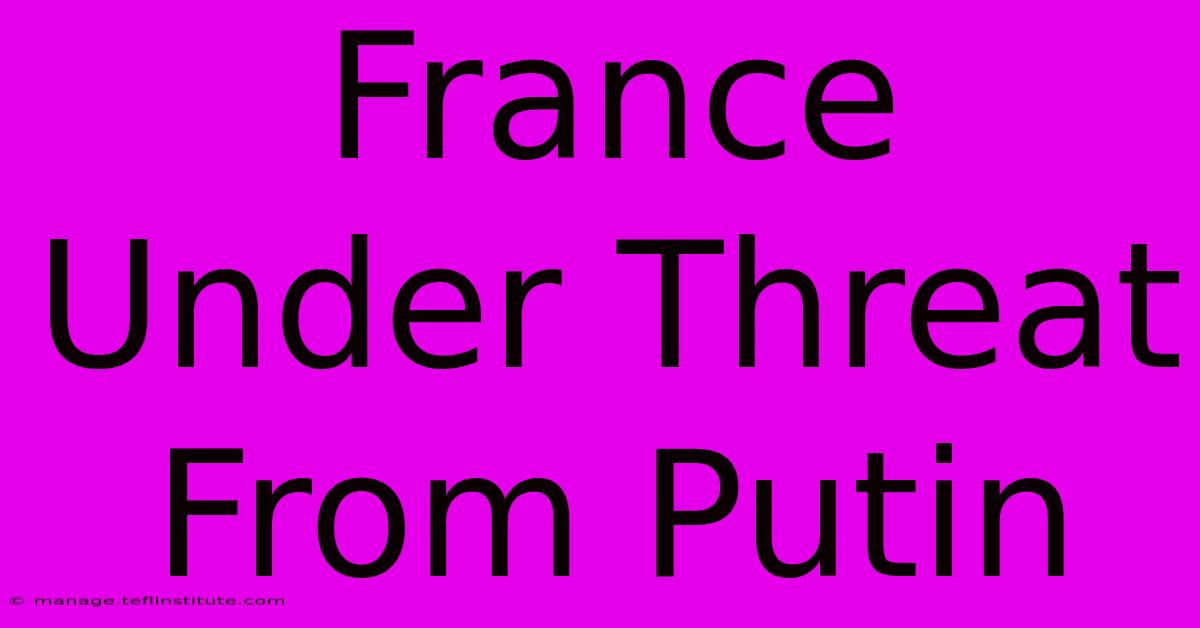France Under Threat From Putin

Table of Contents
France Under Threat From Putin: A Multifaceted Analysis
The notion of France being "under threat" from Vladimir Putin isn't a simple assertion of imminent military invasion. Instead, the threat is multifaceted, encompassing a range of actions and strategies designed to undermine France's sovereignty, influence its political landscape, and weaken its position within the European Union and NATO. While a direct military assault is highly unlikely, the Kremlin employs a more nuanced approach leveraging several key vectors:
1. Information Warfare and Disinformation: Russia has a long history of using propaganda and disinformation campaigns to sow discord and erode public trust in Western institutions. France, a significant European power with a strong media presence, is a prime target. Russian state-backed media outlets, online bots, and troll farms actively spread false narratives, aiming to:
- Divide French society: By promoting anti-immigrant sentiment, highlighting social inequalities, and exploiting existing political divisions, Russia seeks to weaken national unity and hinder effective governance.
- Undermine trust in the EU and NATO: Pro-Kremlin narratives often portray these institutions as ineffective, corrupt, or even hostile to French interests, encouraging skepticism and potentially paving the way for France to adopt a more neutral or pro-Russian stance.
- Influence elections: While direct interference in French elections is difficult to definitively prove, the dissemination of misinformation and the amplification of divisive narratives can sway public opinion and affect electoral outcomes.
2. Economic Leverage: Russia's energy resources provide significant leverage. While France is less reliant on Russian gas than some of its neighbours, fluctuations in energy prices, and the potential for supply disruptions, can still impact the French economy and influence government policy. Furthermore, Russian investment in various sectors could be used as a tool for influence, potentially creating dependencies and vulnerabilities.
3. Political Influence and Espionage: Russia likely engages in covert operations aimed at influencing French political figures and accessing sensitive information. This could involve cultivating relationships with sympathetic individuals, providing funding to pro-Russian groups, or engaging in outright espionage. While concrete evidence is often difficult to obtain, the potential for such activities remains a significant concern.
4. Support for Extremist Groups: While there's no direct evidence of large-scale Russian support for extremist groups in France, the Kremlin has historically been willing to support fringe movements that align with its geopolitical interests. Such support, even if indirect, can destabilize the country and create further challenges for the government.
5. Hybrid Warfare: Russia's approach is characterized by hybrid warfare, blurring the lines between conventional military actions and other forms of conflict. This encompasses all the aforementioned strategies, combined and deployed strategically to achieve maximal impact with minimal direct confrontation.
France's Response:
France is aware of these threats and has taken steps to counter them. This includes strengthening cybersecurity measures, combating disinformation, investing in energy diversification, and reinforcing its intelligence capabilities. France plays a leading role within the EU and NATO in coordinating responses to Russian aggression, both militarily and diplomatically.
Conclusion:
The threat posed by Russia to France is not a matter of imminent invasion, but a persistent campaign of influence and destabilization. Understanding the diverse methods employed by the Kremlin is crucial for France and its allies to effectively counter these threats and protect its sovereignty, security, and interests within a rapidly changing geopolitical landscape. The ongoing conflict in Ukraine underscores the urgency of these efforts and the importance of maintaining a strong and united Western front against Russian aggression.

Thank you for visiting our website wich cover about France Under Threat From Putin. We hope the information provided has been useful to you. Feel free to contact us if you have any questions or need further assistance. See you next time and dont miss to bookmark.
Featured Posts
-
Jutta Leerdams Show Stopping Dress
Nov 17, 2024
-
Nickal Beats Craig At Ufc 309
Nov 17, 2024
-
Energy Secretary Chris Wright Chosen
Nov 17, 2024
-
Ufc 309 Jones Miocic Fight Details
Nov 17, 2024
Latest Posts
-
Twickenham Thriller 5 Post Match Insights
Nov 17, 2024
-
England Vs Australia 5 Crucial Lessons
Nov 17, 2024
-
Australias Win 5 Key Learnings For England
Nov 17, 2024
-
Slade Earl Struggle England Loses
Nov 17, 2024
-
Englands Twickenham Loss 5 Key Lessons
Nov 17, 2024
-
5 Lessons From Englands Twickenham Defeat
Nov 17, 2024
